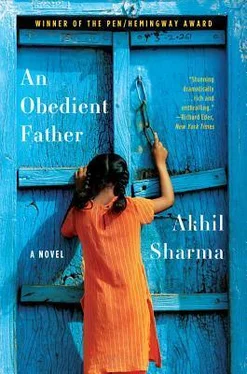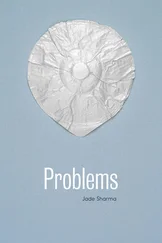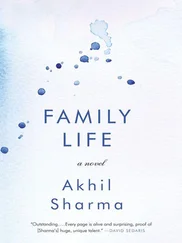One of the children finally broached the subject. "We haven't seen you in a long time."
"Not because I didn't want to see you," he said, looking into the eyes of the boy who had spoken, "but because God chose to keep me
apart from my brother." His voice was so soft it sounded as if he was holding back tears. "Have you seen the movie Time'^ It was like that." Shakuntala made approving sighing clicks.
"You were separated by an earthquake?" Rajesh asked.
Krishna ignored him. "Yesterday, like a miracle, my brother appeared at my door and said, 'Brother, let us stop this fighting. What else is there in the world other than family?' And I told him, 'You are right. I have always loved you.'" I began to be stared at. Could I have said these things? Krishna put a hand on my shoulder. After a moment he said, "Learn from us. Don't make the mistakes we have made, losing the many years of brotherly love."
He would have gone on, but the pundit came with his wife. The pundit was garbed in a saffron robe and had a saffron satchel slung over one shoulder. His wife wore an ordinary green sari. Seeing Krishna, she also wanted to hear the story of our reconciliation. I led the pundit to the common room, but everyone else remained in the living room to hear the story again.
From his satchel the pundit pulled out a thermos bottle with the figure of Superman on it. The thermos held Ganges water, and he poured a cupful onto the center of the common-room floor and scrubbed an area several feet wide with a saffron rag. I was not confident of his competence and wondered if the prayer he would perform would be from a Veda, or whether it was a recipe he had concocted on his own. I sat on the ground and watched him as he, on all fours, drew a two-foot-by-two-foot square with flour. Inside the square, along the edges, he drew small rectangles and filled them with oms, swastikas, flowers. He took a large tin box from his satchel and placed it in the center of the square. Then he began bringing out other things from the bag. A coconut, twigs, sugar twisted in a bit of newspaper, clarified butter in a bottle that used to hold hair oil, rose-colored threads, a bunch of bananas, a small paper bag of apples, a purse full of coins. There was no end to what the satchel contained. His efficiency promised the ability to do the impossible. Anita came into the room and I caught her eye by mistake. She looked calm,
not crazy. She would not do something reckless that would destroy the world.
When the pundit was ready, Anita gathered everyone. People spread themselves around the room. The pundit lit a fire in the tin box.
The ceremony lasted about forty-five minutes. At first I was concerned only with throwing handfuls of rice into the fire at the proper time and following the pundit's lead when he called out "God be praised" or "God is great." The pundit sat on one side of the fire, and Rajesh and I sat opposite him. Anita was a few feet away, at my side. The sun coming through the balcony and the heat of the fire began to lull me. I knew enough Sanskrit to follow what the pundit was saying if I tried. After a while, the rhythm of the prayer snagged me. I could understand it without effort. "I am the fire and that which is consumed. I am the poison, the cure. The beginning without end and the end without beginning."
I began to pray silently and with steady fervor. I kept asking God to free Radha from being reborn, and that if she was reborn, to let our souls not intersect so that we did not repeat our torments. I asked God to let Radha, Anita, Asha never meet me after this life.
Near the end of the prayer, Rajesh and I began to throw coins into the fire. I was pulling my hand away from the fire when I sensed Radha sitting beside me to my right. I did not turn my head, but I knew exactly how she was seated, with her legs crossed lotus fashion, and I could tell where the veins in her arms and feet stood out. I felt her watch me without emotion, as if she were writing down everything that she saw in my heart and head. I shivered. After two or three minutes, this sense of her abruptly vanished, and when it did, it was as if she had died again.
I wept slowly and quietly I was not crying for Radha's death but for the tragedy of her life. It took a few minutes for the others even to notice. When they did, there was an appreciative murmur. I tried to stop crying, but the tears kept coming. I pressed my fingertips to my eyes.
The prayer ended and people stood. I heard the pundit's wife say, "I'm so hungry I could eat a dozen puris."
The phone buzzed. Someone picked it up and yelled, "It's Kusum." Anita left the kitchen for the living room. I was unable to look up and saw only her bare feet. The common room emptied except for me.
"Hello," Anita said, and a moment later: "There is no danger here. You are happy, healthy? Carolyn? Ben?"
There was silence for a little while, and then Bittu's son, Rohit, called to me from the living-room doorway and led me through the crowd that surrounded the phone. Anita passed the phone to me. I could not meet her gaze.
The pundit said, "I should talk to her. It will help." He was smiling ingratiatingly, wanting some of the glamour of an international phone call.
"Pitaji, what's happening there?" Kusum asked.
Kusum lived with her grandmother till she went to college. I had last seen her two years ago, when she brought her husband, Ben, to meet us. She phoned a few times a year and sent postcards whenever she went on holiday. The fact that our lives had touched so little over so many years made me feel that my past was heavy and finished.
"It's one year since your mother died."
"I know," she replied, as if I had accused her of indifference. "Are you crying?" she inquired warily.
"Hello, daughter," the pundit called, leaning over my shoulder.
"Who's that?"
"Punditji. He wants to talk on the phone."
"Tell him a minute to America is forty rupees. Are you crying?"
"Yes."
"Give the phone to Anita, then."
I did, and went to my room. The crying had made me feel drunk. I closed the door and lay down.
When I woke in the middle of the afternoon, the flat was quiet. I stayed on my side and fingered my grief as though it were a bruise. I squeezed out a few fresh tears. I knew I must speak the truth or my life would spin out of control.
I got up and went to the latrine. I heard Anita's footsteps as I squatted. She stopped in front of the door. "I'll be in the living room," she said.
"All right," I murmured. A spider had spun a web right above the faucet. The green paint of the door was puffed with moisture and heat. I shat and shat until there was nothing coming out. I washed myself and stood, but my bowels clenched themselves so tightly that I immediately had to squat again. The world had changed, I told myself
The common room was empty. There were whitish marks on the floor where the pundit had dragged his boxes. I went to the living room.
Anita was sitting on the sofa edge, leaning forward and cupping her knees. When I came in, she looked directly into my eyes, and after that, I could not look at anything but her face. "Asha's away with Shakuntala," she said. Her voice squeaked and she stopped. Anita tried saying something else, but her voice remained unnaturally high and she ceased mid-word. I sat down on the love seat across from her. "I always knew," she began calmly. Her voice continued being high, thin, but she did not stop. "I never didn't know you were cruel, you were merciless. Every time you touched me. Every time you made me touch you, I knew."
I nodded. The sun coming through the living-room window covered her and the sofa with light.
"We have to live together. I can't go anywhere else. I would if. ." She stopped, and started making rapid gasping sounds, as if the possibility of a different life had overcome her. The gasps sounded like huh-huh.
Читать дальше












